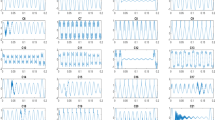Abstract
This paper presents a new power quality (PQ) disturbances identification method based on S-transform time-frequency analysis and RBF network. The proposed technique consists of time-frequency analysis, feature extraction, and pattern classification. Though there are several time-frequency analysis methods existing in the literature, this paper uses S-transform to obtain the time-frequency characteristics of PQ events because of its superior performance under noise. Using the time-frequency characteristics, a set of features is extracted for identification of power quality disturbances. Finally, a RBF network is developed for classification of the power quality disturbances. The proposed method is simple and reached 97.5% identification correct ratio under high signal to noise ratio for those most important disturbances in power system.
Access this chapter
Tax calculation will be finalised at checkout
Purchases are for personal use only
Preview
Unable to display preview. Download preview PDF.
Similar content being viewed by others
References
Xu, Y.H., Xiao, X.N., Yang, Y.H.: Power Quality Disturbance Identification Using Dq Conversion-Based Neural Classifiers. Automation of Electric Power System 14, 24–28 (2001)
Shah, B.S.R., Abdullah, M.Z., Abidin, A.F.: Combination Wavelets And Artificial Intelligent For Classification And Detection Transient Overvoltage. Research and Development, SCORED, 177–180 (2002)
Abdel-Galil, T.K., EL Saadany, E.F., Youssef, A.M.: On-line Disturbance Recognition Utilizing Vector Quantization Based Fast Match. In: Power Engineering Society Summer Meeting, vol. 2, pp. 1027–1032. IEEE, Los Alamitos (2002)
Gaouda, A.M., Kanoun, S.H., Salama, M.M.A.: On-Line Disturbance Classification Using Nearest Neighbor Rule. J. Electr. Power System Research 57, 1–8 (2001)
Styvaktakis, E., Bollen, M.H.J., Gu, I.Y.H.: Expert System For Classification And Analysis of Power System Events. IEEE Trans. Power Delivery 17, 423–428 (2002)
Dash, P.K., MishraK, S., Salama, M.M.A., Liew, A.C.: Classification Of Power System Disturbances Using A Fuzzy Expert System And A Fourier Linear Combiner. IEEE Trans. Power Delivery 15, 472–477 (2000)
Stockwell, R.G., Mansinha, L., Lowe, R.P.: Localization Of The Complex Spectrum: The S transform. IEEE Trans. Signal Process 44, 998–1001 (1996)
Author information
Authors and Affiliations
Editor information
Editors and Affiliations
Rights and permissions
Copyright information
© 2006 Springer-Verlag Berlin Heidelberg
About this paper
Cite this paper
Lv, G., Wang, X. (2006). Power Quality Identification Based on S-transform and RBF Neural Network. In: Huang, DS., Li, K., Irwin, G.W. (eds) Intelligent Computing. ICIC 2006. Lecture Notes in Computer Science, vol 4113. Springer, Berlin, Heidelberg. https://doi.org/10.1007/11816157_52
Download citation
DOI: https://doi.org/10.1007/11816157_52
Publisher Name: Springer, Berlin, Heidelberg
Print ISBN: 978-3-540-37271-4
Online ISBN: 978-3-540-37273-8
eBook Packages: Computer ScienceComputer Science (R0)




